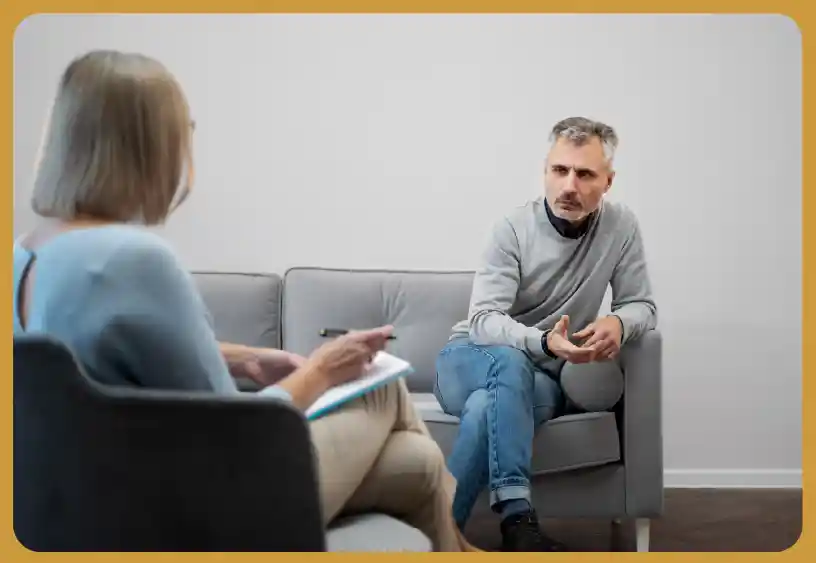
About 2 to 3% of the population have Obsessive-Compulsive Disorder (OCD). This statistic isn't just a number; it represents real people struggling with intrusive thoughts and compulsive behaviors daily. If you've ever found yourself trapped in a cycle of obsessive thinking and compulsive actions, you know how isolating and overwhelming it can feel.
However, recognizing and understanding your symptoms is the first step toward relief. An online self-assessment for OCD can be a valuable tool in this journey. While it won't replace professional diagnosis, it can offer clarity and direction, helping you decide when to seek further help.
Do You Really Have OCD?
It's normal to question whether you might have OCD when intrusive thoughts and repeating actions begin to interfere with your everyday life. Obsessive-Compulsive Disorder is a complicated disorder affecting people in different ways, not only about being too tidy or orderly.
For many, the distinction between odd behavior and OCD might be hazy. If you find yourself spending hours on end addressing obsessive thoughts or compulsive behaviors, it may be more than just a personality feature. Knowing the real character of OCD will enable you to decide whether your experiences fit the condition.
Obsessive Thoughts
Those with obsessive-compulsive disorder typically have unwelcome ideas that linger and create great tension. Two such concerns relate to pollution or damage occurring to loved ones. It is difficult to go about everyday life when the ideas are annoying and sometimes appear impossible to control. This ongoing mental turmoil may be very taxing and frustrating.
Compulsive Behaviors
People with OCD do the same things over and over again, which helps them deal with the worry that their intense thoughts cause. Some examples of these compulsions are washing hands too much, checking locks repeatedly, or putting things in a certain order. These things might help quickly, but they usually take a lot of time and get in the way of daily life. People can spend their whole day doing these routines because they have to.

Time-Consuming Rituals
For those with OCD, rituals they engage in might occupy a significant portion of their daily life and go beyond mere habits. Some people spend hours on end fulfilling their compulsions to feel better or in control. OCD consumes so much time, hence it can interfere with personal relationships, education, and employment. The never-ending cycle of impulses and compulsions may be rather taxing and disruptive.
Avoidance Behaviors
People with obsessive-compulsive disorder do all they can to avoid anything that can aggravate their symptoms. This anxiety might make it more difficult for them to go about daily activities or enjoy socializing. Someone who is terrified of germs, for example, might avoid public areas or refuse to contact particular objects. Their symptoms could get worse and they may feel even more alone from this avoidance.
Insight and Awareness
One important thing about people with OCD is that they often know their urges and compulsions are not making sense. Even though they know this, they feel like they have to keep doing what they're doing to deal with their worry. As they try to break free from the loop, this realization can make them feel frustrated and powerless. To tell OCD apart from other mental health problems, it's important to understand this trait.
OCD Online Self-Assessment
Taking an online OCD self-test can be a very important first step in figuring out if your symptoms are consistent with Obsessive-Compulsive Disorder. The purpose of these tests is to give you a structured way to think about your ideas, actions, and feelings.
Questionnaire Format
A lot of the online tests for OCD are in the form of questionnaires. There will be several questions about your experiences with having obsessive thinking and doing things over and over again. These questions usually cover a range of situations to help you figure out what your symptoms are and what causes them. The assessment might also ask how these symptoms affect your daily life, like how they affect your job, your relationships, and your health in general. Giving an honest and complete answer is very important because it gives the most exact picture of your position.
Immediate Feedback
Online self-evaluations have one advantage in that they provide feedback immediately away. You will receive a report of your results after completing the questionnaire, usually including a remark regarding whether your symptoms indicate OCD. This input can help you determine the severity of your symptoms and guide your decision on whether or not more assistance is needed. Certain tests may also provide tools or next actions, including OCD-learning resources or contact details of mental health professionals. This quick reaction might inspire and reassure you, thereby pushing you to act and seek help.
Anonymity and Accessibility
You can feel comfortable if you perform your self-evaluations online as you can remain anonymous. As you sit for the test from the comfort of your own house, nobody will be able to view or evaluate you. Those who are hesitant or afraid of sharing their difficulties with others should especially pay this great importance. These exams are also available at any moment, which facilitates their fit into your schedule. Whether you're a student with a packed schedule or a working person, the flexibility to complete the exam whenever it would be most convenient for you might be beneficial. More individuals getting support and learning more about their mental health might find this simpler.
Limitations
Self-assessments you do online can be helpful, but they are not a replacement for analysis and treatment by a professional. To begin, these tools can help you understand your conditions better, but they are not complete solutions. A full evaluation that takes into account your history, any new symptoms, and your general mental health might be performed by a mental health specialist, such as a psychologist or therapist. They can also make a specific treatment plan for you that could include therapy, medicine, or other help. If you only use an online exam without talking to a professional, it could lead to confusion or delays in getting the right care. You should keep in touch with your healthcare provider to make sure you're getting the help and care you need.

What to Do Next?
Following an online self-assessment for OCD, one should see a mental health expert for an all-encompassing review. Bring your evaluation findings to the visit to offer a basis for conversation. A specialist can verify the diagnosis, investigate the degree of your symptoms, and suggest a customized treatment strategy, maybe including therapy, medicine, or both together. Seeking expert advice guarantees you the tools and assistance required to properly control OCD, therefore enhancing your quality of life.
- Share














